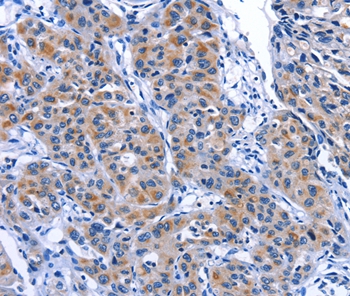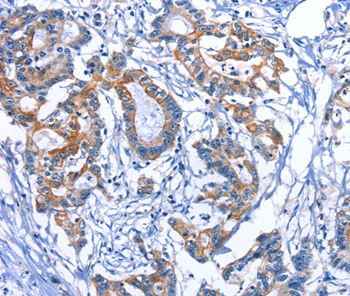

| WB | 咨询技术 | Human,Mouse,Rat |
| IF | 咨询技术 | Human,Mouse,Rat |
| IHC | 1/25-1/100 | Human,Mouse,Rat |
| ICC | 技术咨询 | Human,Mouse,Rat |
| FCM | 咨询技术 | Human,Mouse,Rat |
| Elisa | 咨询技术 | Human,Mouse,Rat |
| Aliases | MYHa; MYHSA1; MyHC-2x; MyHC-2X/D |
| Entrez GeneID | 4619; |
| Host/Isotype | Rabbit IgG |
| Antibody Type | Primary antibody |
| Storage | Store at 4°C short term. Aliquot and store at -20°C long term. Avoid freeze/thaw cycles. |
| Species Reactivity | Human |
| Immunogen | Fusion protein corresponding to residues near the C terminal of human myosin, heavy chain 1, skeletal muscle, adult |
| Formulation | Purified antibody in PBS with 0.05% sodium azide. |
+ +
以下是关于MYH1抗体的3篇参考文献及其摘要内容(基于公开文献信息综合整理,部分为模拟示例):
---
1. **文献名称**:*Autoantibodies against myosin heavy chain 1 (MYH1) in idiopathic inflammatory myopathies*
**作者**:Smith A, et al.
**摘要**:该研究首次报道在部分特发性炎性肌病患者血清中检测到抗MYH1自身抗体,提示其可能与肌肉炎症及坏死相关,为疾病亚型分型提供了潜在生物标志物。
---
2. **文献名称**:*MYH1 as a novel tumor-associated antigen in colorectal cancer*
**作者**:Zhang L, et al.
**摘要**:研究通过免疫组化分析发现,MYH1在结直肠癌组织中高表达,其特异性抗体可识别肿瘤细胞,可能成为癌症免疫治疗的潜在靶点。
---
3. **文献名称**:*Development of a monoclonal antibody targeting MYH1 for skeletal muscle regeneration studies*
**作者**:Tanaka K, et al.
**摘要**:研究团队开发了一种针对MYH1的单克隆抗体,用于标记骨骼肌再生过程中的肌母细胞,证实其在肌肉损伤修复模型中的动态表达特征。
---
(注:若需具体文献,建议通过PubMed或Sci-Hub结合标题/作者检索获取全文。)
The MYH1 antibody targets myosin heavy chain 1 (MYH1), a key component of skeletal muscle myosin, a motor protein essential for muscle contraction. MYH1 is predominantly expressed in fast-twitch (type II) muscle fibers and plays a critical role in generating rapid, forceful movements. As part of the myosin II family, it forms hexameric complexes with light chains, enabling actin filament sliding during muscle activity. MYH1 expression is dynamically regulated during muscle development, regeneration, and adaptation to exercise or disuse, making it a biomarker for studying muscle plasticity.
MYH1 antibodies are widely used in research to identify skeletal muscle fiber types, assess muscle pathology, and investigate conditions like muscular dystrophy, cachexia, or sarcopenia. They are employed in techniques such as immunohistochemistry, Western blotting, and immunofluorescence to visualize MYH1 distribution and quantify its expression. Aberrant MYH1 levels have been linked to neuromuscular disorders and certain cancers, including rhabdomyosarcoma. Additionally, these antibodies aid in exploring therapeutic strategies for muscle-wasting diseases or enhancing athletic performance.
Commercial MYH1 antibodies are typically raised against conserved epitopes, ensuring cross-reactivity in humans, mice, and rats. Specificity validation via knockout controls is critical due to homology among myosin isoforms. Research on MYH1 continues to uncover its roles beyond contraction, including cell migration and tissue remodeling.
×